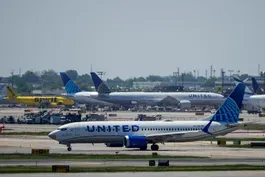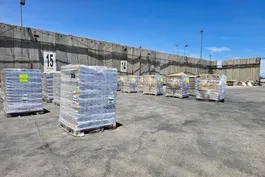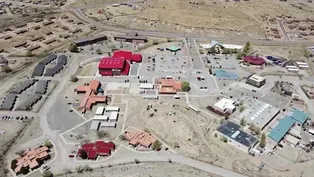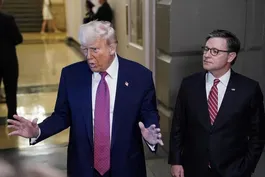
Spring storms spark FEMA scrutiny as Trump overhauls agency
Clip: 5/20/2025 | 7m 4sVideo has Closed Captions
Spring storms spark scrutiny of FEMA as Trump overhauls and slashes the agency
It's been another day of storms and tornado watches in parts of the South. For the better part of a week now, severe weather has led to major damage and deaths in its wake. As residents are beginning to dig out, there are real questions about the immediate federal response and what states can expect this summer as the Trump administration makes big changes to FEMA. William Brangham reports.
Problems with Closed Captions? Closed Captioning Feedback
Problems with Closed Captions? Closed Captioning Feedback
Major corporate funding for the PBS News Hour is provided by BDO, BNSF, Consumer Cellular, American Cruise Lines, and Raymond James. Funding for the PBS NewsHour Weekend is provided by...

Spring storms spark FEMA scrutiny as Trump overhauls agency
Clip: 5/20/2025 | 7m 4sVideo has Closed Captions
It's been another day of storms and tornado watches in parts of the South. For the better part of a week now, severe weather has led to major damage and deaths in its wake. As residents are beginning to dig out, there are real questions about the immediate federal response and what states can expect this summer as the Trump administration makes big changes to FEMA. William Brangham reports.
Problems with Closed Captions? Closed Captioning Feedback
How to Watch PBS News Hour
PBS News Hour is available to stream on pbs.org and the free PBS App, available on iPhone, Apple TV, Android TV, Android smartphones, Amazon Fire TV, Amazon Fire Tablet, Roku, Samsung Smart TV, and Vizio.
Providing Support for PBS.org
Learn Moreabout PBS online sponsorshipGEOFF BENNETT: It has been another day of storms and tornado watches in parts of the South.
For the better part of a week now, severe weather has left major damage and deaths in its wake.
As residents are beginning to dig out, there are real questions about the immediate federal response and what states can expect this summer as the Trump administration makes big changes to FEMA.
Here's William Brangham.
WILLIAM BRANGHAM: A family comes to grips with what they have lost.
It's one of many surreal scenes of devastation across the Midwest and southeast, as communities reckon with the aftermath of days of severe storms and dozens of tornadoes.
(SIRENS BLARING) WILLIAM BRANGHAM: Late Friday, a powerful twister tore through Laurel County, Kentucky, killing at least 19 people and destroying homes.
In St. Louis, Missouri, another tornado on the same day killed at least five people and injured 38 more when it tore through this densely populated part of the city.
MYA GRIMES, Tornado Survivor: Well, my car ended up right here.
WILLIAM BRANGHAM: Twenty-year-old Mya Grimes was driving home when her car was seized by the tornado.
MYA GRIMES: As I was spinning in circles, just thinking every terrible thought that you could imagine and praying, I was flung out of my car, the driver's side door opened, and I just flew.
WILLIAM BRANGHAM: That tornado cut a miles-long path of destruction through North St. Louis, damaging roughly 5,000 buildings and causing an estimated $1 billion in damage.
Compounding the destruction are reports of a sluggish federal response.
CARA SPENCER, Mayor of St. Louis, Missouri: What we need right now is federal assistance.
WILLIAM BRANGHAM: St. Louis Mayor Cara Spencer told MSNBC that, as of yesterday, her city is still waiting for assistance from FEMA, the Federal Emergency Management Agency.
CARA SPENCER: Our city cannot shoulder this alone.
The state of Missouri cannot shoulder this alone.
We need partners at the national level, at the federal level to step up.
WILLIAM BRANGHAM: Missouri's governor, Mike Kehoe, said FEMA teams are expected on the ground tomorrow.
President Trump has suggested FEMA should largely be eliminated.
He wants responsibility for disaster relief to be handled principally by individual states.
The acting head of FEMA was replaced earlier this month after contradicting that idea, saying he didn't support dismantling the agency.
This morning on Capitol Hill, Missouri Senator Republican Josh Hawley pressed Homeland Security Secretary Kristi Noem to approve an emergency declaration for his state.
SEN. JOSH HAWLEY (R-MO): We need it as quickly as possible.
Will you help us expedite that?
KRISTI NOEM, U.S.
Homeland Security Secretary: Absolutely.
I have spoken with your governor and did that day that this devastation happened.
And so we have promised and pledged to get that expedited as soon as possible.
WILLIAM BRANGHAM: Hawley said three other major disaster declaration requests from Missouri still haven't been approved.
And it's a problem not just in Missouri.
Frustration is growing in Tylertown, Mississippi, where residents say they're still waiting for federal assistance some two months after a tornado tore through their town.
BOBBY MCGINNIS, Tylertown, Mississippi Resident: I know President Trump said that America first, we're going to help our American folks first.
But we haven't seen the federal folks down here.
WILLIAM BRANGHAM: All this while tens of millions of Americans are under warnings for more severe weather this afternoon and into tonight, with the highest potential for dangerous storms across the South.
So, for more on the changes happening within FEMA and what this means for communities facing natural disasters, we are joined by Hayley Smith.
She's the environment reporter for The Los Angeles Times.
Hayley Smith, thank you so much for being here.
There is this turmoil within FEMA.
The former head, acting head, gets ousted because he contradicts the president's vision.
The new head, David Richardson, doesn't seem to have a lot of experience in disaster management.
What does your reporting tell us about what's going on within FEMA right now?
HAYLEY SMITH, Environment Reporter, The Los Angeles Times: Yes, so just in the five or six months since President Trump has taken office, there's been a number of changes or turmoil, as you said, within the agency.
That includes layoffs and budget cuts, grant cancellations, leadership changes.
My reporting has shown that at least 2,000 staffers have either taken a buyout or been fired already this year.
That's an estimated 30 percent of FEMA's work force, so big changes there.
And it's worth noting that all of that is happening against this larger backdrop of climate disasters getting worse and more frequent and more expensive here in the United States.
You have got the tornadoes in Kentucky and Missouri.
Here in Los Angeles, we had these $250 billion wildfires here in January.
And we haven't even gotten to the peak of hurricane season and fire season yet this year.
WILLIAM BRANGHAM: So President Trump has said that he largely wants to phase out FEMA and push the responsibility principally to the states.
What does your reporting indicate about the state's ability to pick up that slack?
HAYLEY SMITH: Yes, this is the great question.
This is the billion-dollar question, right?
I think that the experts I have spoken to have said it's potentially a conversation worth having in terms of how much the states should be managing and how much the federal government should when it comes to disaster response.
But any kind of transition like that is something that would need to happen slowly.
We need to make sure that states have the time to prepare for that kind of responsibility.
That would be staffing.
That would be budget.
That would be infrastructure.
It's not something that can happen in one fell swoop.
And so right now a lot of states are in limbo and not sure of -- if response -- if aid is going to come when they need it and how much is going to be expected to fall onto their shoulders.
WILLIAM BRANGHAM: And this new head, David Richardson, do we have any sense as to whether he is in line with President Trump's vision of a much diminished role for FEMA?
HAYLEY SMITH: Yes, very much so.
So, as you mentioned, the previous director was fired earlier this month just one day after he testified in front of Congress that he did not think it would be in the best interest of the American people for FEMA to be broken up or eliminated.
And his successor, David Richardson, has said that he fully intends to carry out the president's directives to a T, that he is very much interested in pushing the response on to the states and that he is not going to be tolerating anyone at the agency who stands in his way.
WILLIAM BRANGHAM: All right, that is Hayley Smith, environment reporter of The L.A. Times.
Thank you so much for sharing your reporting with us.
HAYLEY SMITH: Yes, thank you for having me.
Ex-FAA official discusses near misses and outages
Video has Closed Captions
Clip: 5/20/2025 | 5m 27s | 'Vintage' air traffic system to blame for near misses and outages, ex-FAA official says (5m 27s)
Is defending Taiwan vital to U.S.? Experts offer views
Video has Closed Captions
Clip: 5/20/2025 | 9m 35s | Is defending Taiwan a vital U.S. interest? Experts offer differing views (9m 35s)
Jonathan Capehart on his new memoir 'Yet Here I Am'
Video has Closed Captions
Clip: 5/20/2025 | 7m 22s | Jonathan Capehart chronicles his journey toward self-discovery in 'Yet Here I Am' (7m 22s)
News Wrap: UN says aid still not reaching Gaza
Video has Closed Captions
Clip: 5/20/2025 | 6m 7s | News Wrap: UN says aid still not reaching Gaza (6m 7s)
Tribal colleges face uncertain future amid funding cuts
Video has Closed Captions
Clip: 5/20/2025 | 7m 54s | Tribal colleges face uncertain future amid federal funding cuts (7m 54s)
Trump pushes GOP holdouts to support his domestic bill
Video has Closed Captions
Clip: 5/20/2025 | 7m 2s | Trump pushes GOP holdouts on Capitol Hill to support his massive domestic policy bill (7m 2s)
Providing Support for PBS.org
Learn Moreabout PBS online sponsorshipSupport for PBS provided by:
Major corporate funding for the PBS News Hour is provided by BDO, BNSF, Consumer Cellular, American Cruise Lines, and Raymond James. Funding for the PBS NewsHour Weekend is provided by...

















